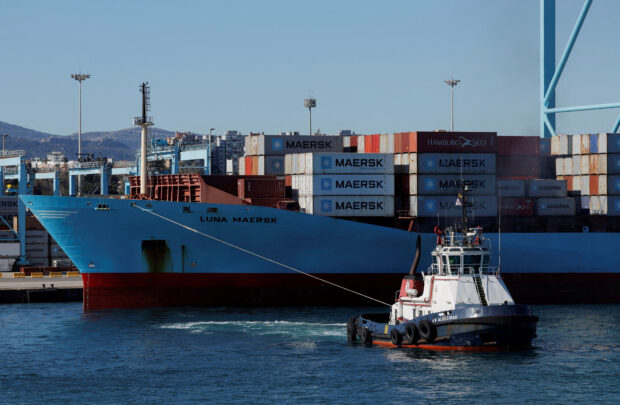
Containers are seen on the Maersk’s container ship Luna Maersk at the APM Terminals in the port of Algeciras, Spain Jan 19, 2023. REUTERS/Jon Nazca/File photo
LONDON – The euro zone recovery picked up pace last month but the upturn was uneven across industries and countries, according to a survey which showed price pressures remained elevated in the region.
S&P Global’s Composite Purchasing Managers’ Index (PMI), seen as a good gauge of overall economic health, climbed to a 10-month high of 53.7 last month from 52.0 in February, shy of a 54.1 preliminary reading.
March was its third straight month above the 50 mark separating growth from contraction.
“The euro zone economy continues to bounce back from the lull we saw at the back-end of 2022 and the latest PMI survey will add fresh conviction to the view that, at least for now, the euro area is clear of a recession,” said Joe Hayes, senior economist at S&P Global.
“March’s increase in economic activity mainly reflected strong growth across the service sector. Better momentum here is encouraging given the squeeze on household incomes from high inflation and rising borrowing costs.”
The PMI covering the bloc’s dominant services industry bounced to 55.0 from February’s 52.7, albeit below the 55.6 flash estimate.
That stands in contrast to a manufacturing PMI published on Monday which showed activity at factories fell further last month as consumers, feeling the pinch from rising living costs, cut back.
S&P Global said there was also a difference among member countries with a considerable upward push to growth coming from Spain and, to a lesser extent, Italy. But activity in Germany and France rose only modestly, painting a more conservative picture of underlying economic health.
Despite rising costs, demand for services was at a 10-month high and the new business index rose to 54.2 from 52.2, in part driven by an increase in export demand for the first time since May last year.
Although the pace of increases in both input and output costs waned, it remained high. The composite output prices index fell to 58.1 from 60.8.
While that will likely be welcomed by policymakers at the European Central Bank, who have so far failed to get inflation anywhere near their 2 percent target, it does point to further interest rate rises.
Having delivered an expected 50 basis point increase to interest rates last month, a Reuters poll suggested the ECB would follow through with 25 basis points lifts at its May, June and July meetings.
“The case for further interest rate increases also remains strong based off the survey’s price gauges. Although inflation rates have cooled from their peaks, they continue to run in hot territory, particularly across the service sector,” Hayes said.
RELATED STORIES:
Recession alarm bells are ringing, but (much) less loudly than before
https://business.inquirer.net/388782/ecb-has-started-to-win-inflation-fight-lane-says